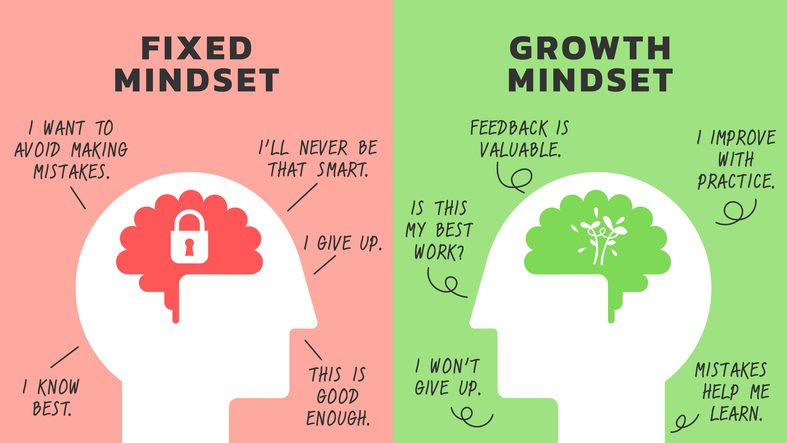Whether you’re in the business world or in regular therapy (or both), you might have heard of the concept of understanding the differences between a fixed mindset and a growth mindset. All of us have a little of both. However, some people find that continuing to explore a growth mindset is especially beneficial in recovery.
What Are Fixed vs. Growth Mindsets?
Psychologist Carol Dweck, a Stanford University professor, says her research “examines the self-conceptions (or mindsets) people use to structure the self and guide their behavior. It looks at the origins of these mindsets, their role in motivation and self-regulation, and their impact on achievement and interpersonal processes.”
Dweck first introduced the concept of fixed vs. growth mindsets in her 2006 book, Mindset: The New Psychology of Success. Here’s how it works.
Fixed mindset
A person with a fixed mindset believes that their intelligence, talents and other abilities can’t be changed. They think they’re born with certain skills, and so when faced with challenging situations, if they don’t believe they have the ability to complete the task, they won’t improve. Additional characteristics of a fixed mindset include:
- An avoidance of challenges
- Difficulty accepting failure or mistakes
- Refusal to accept feedback or criticism
- Feeling threatened by others’ success
- Discomfort with unfamiliar things
- A focus on proving oneself through success or failure
All of us present these characteristics at one time or another, but someone with a more constant fixed mindset will likely not learn from mistakes, as they believe they can’t, so there’s no need to try.
Growth mindset
Conversely, Dweck’s research indicates that cultivating more of a growth mindset means a person views setbacks and mistakes as learning opportunities: simply overcome the obstacle by taking a lesson from it and try again by using new information to work harder to achieve their goals. Someone with a growth mindset will:
- Embrace constructive feedback
- Learn and grow from failures
- Be willing to step out of their typical comfort zone
- Use others’ successes as inspiration
- Believe that talent is always evolving
- Direct focus more on the process than the result
Dweck believes that with practice, everyone has the capacity to adapt more of a growth mindset in many situations.
How Might a Growth Mindset Work in Recovery?
It all comes down to acknowledging and rewarding effort. For example, Dweck’s research shows that praising someone simply for a success reinforces a fixed mindset. Instead, acknowledging the effort and the process of learning adds to their motivation to keep trying and continue striving.
So how might developing a growth mindset benefit you in recovery? Here are some ideas to consider:
You build better resilience
This is a level of mental “toughness” that helps you bounce back from difficult situations, accept what happened, and then move forward with a new plan. In fact, you might actually recognize how much more resilience you have now in recovery than you did before treatment.
You step into your capabilities more fully
Sure, we all want the easy way! But there’s a true sense of accomplishment that comes from trusting yourself and moving out of your comfort zone to:
- Speak up in a support group
- Become a sponsor for someone in a 12-Step program
- Talk calmly with family and friends about why working on your sobriety matters to you
- Seek out sober friends and activities
Keep in mind: not every person will do every single thing. Using a growth mindset means you have a clearer picture of how to use your strengths to support areas of limitation.
You believe there are always more opportunities
Many people who develop alcohol use disorder and substance use disorder can become quickly discouraged when challenges in recovery—or even an actual relapse—stalls progress. This is only natural. But maintaining a growth mindset in recovery means you recognize the value of what you learn from different experiences and try to use this knowledge to chart a better course.
Does a growth mindset mean you look at every setback with total positivity? Not really. You’re allowed to experience your emotions with every situation. However, as Dweck puts it, having a growth attitude of “not yet” reduces a fixed mindset inclination to see everything as pass/fail or either/or and instead helps you embrace how you’re always evolving as a human being.
In this video, she talks more about the “not yet” principle.
Find Room to Grow at Fair Oaks
When you’re in survival mode, it’s difficult to consider new ways of thinking and adopt them to your life, even if you realize deep down that they might help. One strong benefit to rehabilitation is an exposure to different ideas, people with various backgrounds, and professionals committed to helping you heal and craft a deliberate path in life. Combined with a solid alumni support network, you can discover better aspects of yourself in sobriety. Find out what opportunities await you at our addiction rehabilitation center in Sacramento.



